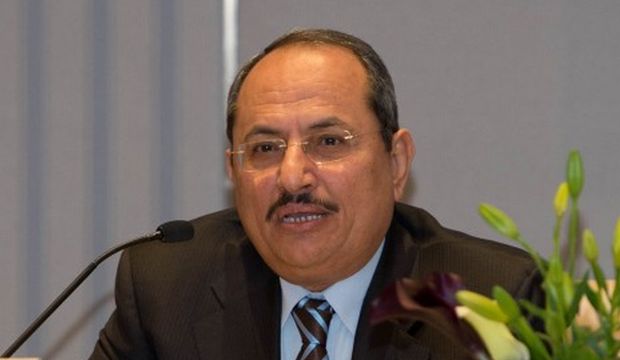
Undated file photo of the director-general of the Arab Labor Organization (ALO), Ahmed Luqman. (Asharq Al-Awsat)
Cairo, Asharq Al-Awsat—Recent advances by Yemen’s Houthi movement will ultimately backfire against the Shi’ite group, a former Yemeni prime ministerial candidate has said, asserting that the most important issue during the current difficult period the country is passing through is that of ensuring national unity.
In comments to Asharq Al-Awsat, the director-general of the Arab Labor Organization (ALO), Ahmed Luqman, also said: “The Houthis’ relationship with Iran is more of a burden than an advantage. I do not think that Iran can take control of Yemen; this would be very difficult,” in response to allegations that Tehran is backing the Shi’ite group.
He called on Yemen to pursue a foreign policy based on ensuring good relations with all regional states, including Shi’ite Iran and Sunni-majority Gulf Cooperation Council (GCC) states. “We can move closer or away from ideas, but it is not in Yemen’s interests to be in a state of hostility with any state. Iran is a large and important country and we respect it,” he said.
“Yemen’s relations with Gulf states must be solid and strong. We are each other’s strategic depth. We respect all the Gulf states, and particularly the Kingdom of Saudi Arabia and its assistance with regards to the Gulf Initiative,” he added.
Houthi fighters took over the capital Sana’a in September following widespread protests over a controversial government fuel subsidy cut and a lack of representation. After a tense standoff, Sana’a and the Houthis signed a peace and partnership agreement which will see the establishment of a new government to be led by consensus figure Khaled Bahah.
Luqman was one of the candidates put forward by the various political factions in Yemen as a unifying figure, but ultimately rejected the post.
He told Asharq Al-Awsat that “the weakness of the state contributed to the rise of the Houthis, as well as the actions of the state and the changes that took place in Yemen in 2011.” He said the former government had made a number of mistakes in the period following the ousting of former president Ali Abdullah Saleh, most prominently failing to ensure that Yemen’s controversial former president and his allies were completely removed from the decision-making process.
“[Former] president Ali Abdullah Saleh was ousted from the presidency but he remained in power,” Luqman said.
However, he argued that Yemen’s current leadership, including current President Abd Rabbuh Mansur Hadi, would be able to overcome the political challenges facing the country and emerge with a true consensus government. Luqman hailed Hadi as a “balanced and prudent leader who is aware of the difficulties facing the current stage.”
“The most important thing is to secure a true consensus government because the forthcoming stage will be very difficult. This will require a government that is wise and determined to succeed and is capable of making difficult decisions,” he added.
However, even if a true consensus government is formed, Luqman warned that Yemen was facing a number of other challenges that Sana’a must deal with.
“The next battle will be over the constitution and political orientation [of the next government], as well as the issue of Yemen’s [federal] regions. There is diverse opinion on this, with one view calling for two [federal] regions, and another backing the establishment of six [federal] regions,” he said.
As for fears for Yemen’s territorial integrity, he said the main objective of the National Dialogue Conference had been to ensure Yemen remained a single state, acknowledging that the main challenge remained ensuring political and economic parity and fairness between the northern and southern parts of the country, which were formerly separate states.
“It is not in anybody’s interests for Yemen to be divided. I believe that this will not be advantageous, whether domestically, regionally or internationally,” Luqman said.
“We acknowledge that mistakes and injustices were made [towards southern Yemen] and that must be dealt with prudently and fairly,” he added.
